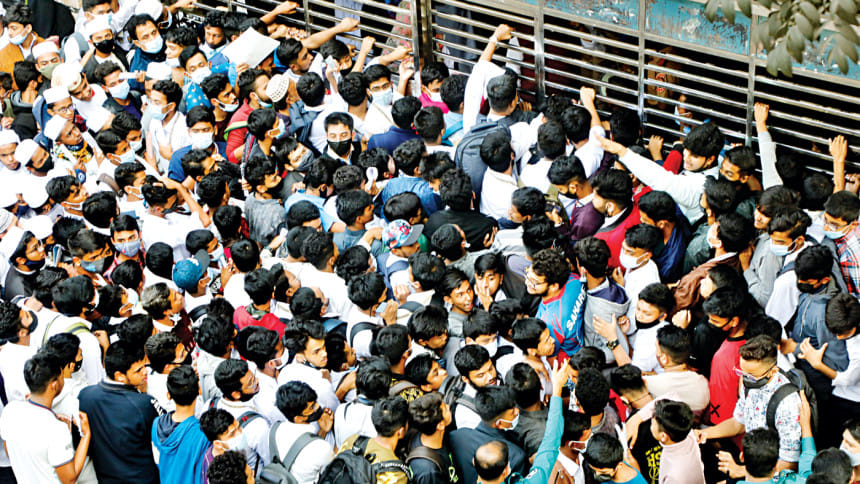Covid-19 Cases: Not alarming yet, but it’s getting there

Everything is under control -- still. But the ticking hospital bed occupancy rate from the turn of the year presages a storm ahead, not too dissimilar from the one witnessed about six months ago.
On the first of January, 9 percent of the intensive care unit-equivalents wards were occupied by Covid-19 patients. Yesterday, it was 19 percent, according to the COVID-19 Dynamic Facility Dashboard of the health directorate.
Similarly, the occupancy rates for ICUs and high dependency units (HDU) crept up: from 12 percent to 15 percent and from 11 percent to 13 percent respectively.
The caseload has shot up 115 percent in the last week. And in the 24 hours to 8 am yesterday, 1,491 fresh cases were recorded -- the highest since Sept 21 last year, according to data from the Directorate General of Health Services (DGHS).
And the reason for the surge is the latest variant of the coronavirus: Omicron.
The variant has undergone 50 genetic changes, making it more transmissible than the dominant Delta variant and more likely to evade the immune protection provided by vaccines or previous infection.
Subsequently, it is causing a fresh wave of coronavirus cases the world over, compelling governments to enforce measures to restrict social mixing.
In Bangladesh, the official tally of Omicron cases stands at 21 as of yesterday. But health officials believe the fast-multiplying variant is causing the spike in cases witnessed in recent days.
Vaccinated patients are more likely to experience milder disease, and a vast majority of Omicron patients who require intensive care are unvaccinated or have severely compromised immune systems, reports The New York Times.
But in Bangladesh, the rate of vaccination is modest: as of January 6, 39 percent of the targeted population and 31 percent of the total population have received both doses of the Covid-19 vaccine, according to the DGHS.
At the same time, the administration of booster dose, which is said to provide bigger and broader protection against the Omicron variant, has not taken off on a massive scale.
In short, all the components indicate a storm is brewing.
Until now, the rate of hospital admissions from illnesses caused by the coronavirus has been slower than six months ago, when the Delta variant was wreaking havoc, said Forhad Uddin Chowdhury Maruf, a medicine and infectious disease specialist at the Dhaka Medical College Hospital.
During July last year, the overall bed occupancy rate skidded to about 90 percent -- leaving hospitals stretched precariously thin.
"If the transmission of Omicron happens massively, the number of patients will definitely increase," he added.
But the number of critical patients will be less than it was seen during the second wave of Covid-19 caused by the Delta variant, according to Mushtuq Hussain, consultant of the Institute of Epidemiology, Disease Control and Research.
"Any massive transmission will cause a rush of patients to the hospitals again. We have seen pressure on hospitals in countries where Omicron has spread fast and extensively -- a similar situation may arise here."
To avoid such a scenario and stricter measures like lockdowns, he stressed firm enforcement of health and safety compliances.
"The most urgent step right now is to stop the mass gatherings. The community events should also be limited. Otherwise, there will be no alternative to imposing lockdown, even though the Omicron seems milder than the Delta," he added.
To avoid a repeat of the dire scenario seen during the previous wave of infections, the government has ramped up its vaccination efforts in recent days.
"Transmission has been on the rise -- we want to ensure vaccines for more people," Health Minister Zahid Maleque told journalists yesterday after attending the foundation stone unveiling ceremony of Cancer Treatment Centres at eight divisional government medical college hospitals.
There is no shortage of vaccines, but people seem to have lost interest in taking the vaccine, he said.
"That's why we are running awareness campaigns."
The government has gone to community clinics for administering vaccines, while the number of wards offering the vaccine at the union level would be increased from three to nine.
While the vaccine does not prevent the spread of Covid-19, it certainly reduces the chances of death, Maleque said, while urging everyone to wear masks and follow the health rules to prevent another wave of coronavirus cases.

 For all latest news, follow The Daily Star's Google News channel.
For all latest news, follow The Daily Star's Google News channel. 



Comments